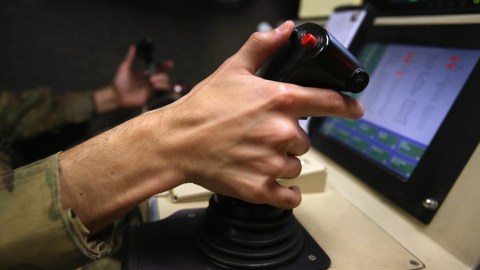Your Video Gaming Skills Could Earn Big Bucks in This Industry Looking for Workers

Video gaming often gets a bad rap, blamed for violent content and spearheading societal degradation. Now in some positive news, it turns out video gamers are developing some skills that are marketable IRL, in real life. A new study from researchers at the University of Liverpool found that video gamers can fly drones better than professional pilots.
Drones have become an ever-growing reality of our daily lives, so much so that there is currently a deficit of qualified pilots. The military, in particular, has a constant need for people to operate the drones it uses for tasks like surveillance, targeting and dropping explosives.
The study, led by Dr. Jacqueline Wheatcroft, focused on three groups of potential pilots of Unmanned Aerial Systems (UAS) or drones. These included video game players (VGPs), private pilots and professional pilots. Why were the gamers involved? It turns out they have many crossover skills – hand-eye coordination and rapid processing of information.
60 participants (51 males and 9 females) underwent a series of exercises, where they had to make 21 decisions that carried potential risks, all while flying a simulation of a civilian cargo flight. An increase in danger led to a decrease in the levels of confidence and accuracy of the participants. In dangerous situations, the subjects had to decide whether to intervene rather than to rely on automation. Confidence in decision-making during such situations was lower for all groups.
Researchers concluded that gamers and professional pilots were the most confident decision-makers, with the gamers showing the best judgment.In fact, VGPs were quite cool-headed, exhibiting strong confidence and accuracy over a number of varying tasks.
“Understanding which potential supervisory group has the best skills to make the best decisions can help improve UAS supervision. Overall, video game players were less overconfident in their decision judgements,” said Dr. Wheatcroft. “The outcome supports the idea that this group could be a useful resource in UAS operation.”
Dr. Wheatcroft added that automation does not eliminate humans from the equation completely – it transforms their role from “operator to supervisor.”
“Such transformation means that the workload of the human supervisor is not necessarily reduced but instead requires cognitive resource and skills to be applied across a different set of tasks,” she explained.
This is where gamers come in – they have the necessary cognitive resources and skills.
“VGPs exhibit some skills that may be required in successful UAS supervision, particularly as they are least likely to exhibit overconfidence in decision judgements,” she concluded.
Check out the study here, published in Cogent Psychology.
If you want to become a drone pilot for the U.S. Air Force, it’s currently giving out the maximum bonus of $35,000 a year to drone pilots – totalling $175,000 on a 5-year contract. But make sure to weigh the psychological risks, as this piece from Vice makes clear. A 2013 trade group report projected more than 100,000 new jobs in unmanned aircraft by 2025.
Check out this write-up by The Atlantic for more on how to become a commercial drone pilot. Drone pilots earn from a starting salary of $50-60,000 to well over $100K if they fly for larger companies.
You can also join the Drone Racing League, with contracts up to $100,000.





